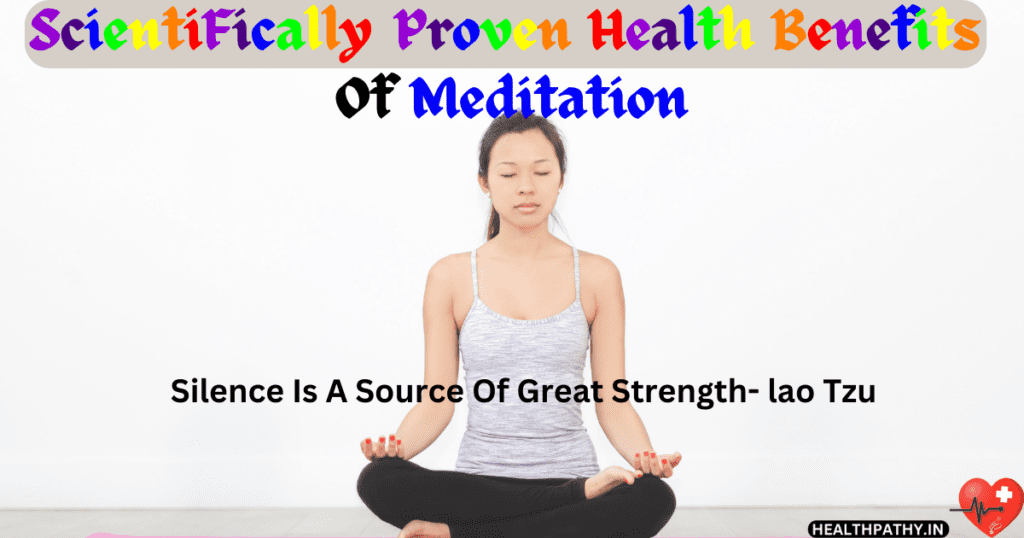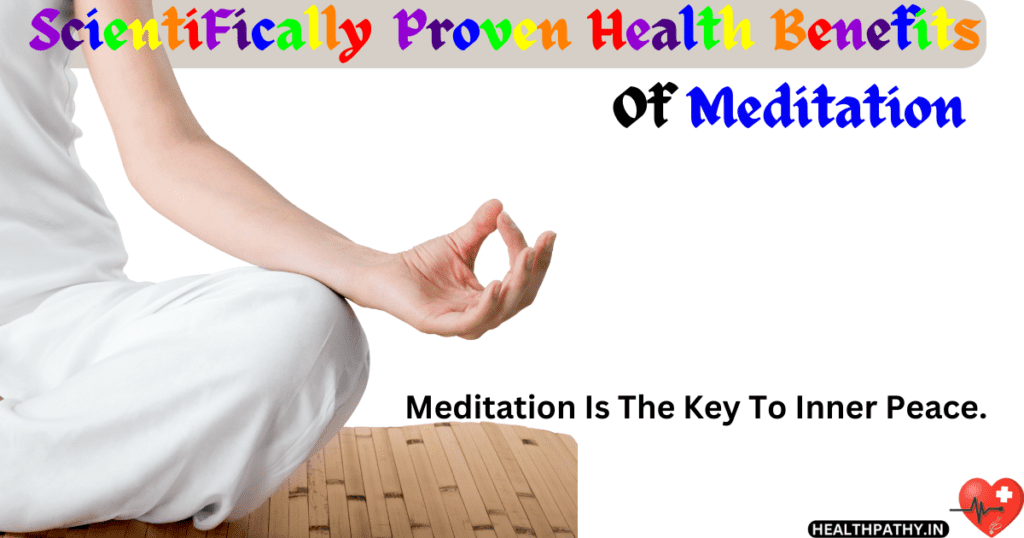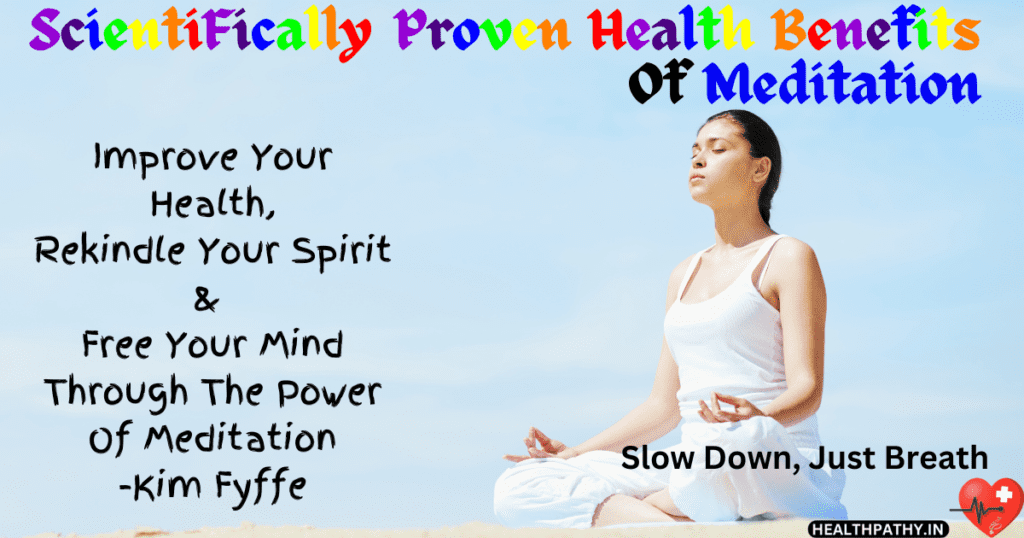Hello, I’m a homeopathic doctor with over 26 years of clinical practice, starting in 1997. My passion is to simplify complex medical concepts so that everyone can understand them. Join me on this educational trip as I analyze the Scientifically Proven Health Benefits of Meditation in an approachable and understandable manner. Let’s take a trip into the world of holistic health together!


Meditation offers a wide variety of health blessings, consisting of:
Meditation is a practice that involves training the mind to focus on a particular object, idea, or hobby to gain a sense of intellectual readability, relaxation, and heightened recognition. It is often used to promote relaxation, reduce stress, beautify self-consciousness, and gain a feeling of internal peace. Meditation strategies can range widely; however, they generally contain deep concentration and a planned attempt to quiet the mind’s regular chatter. The remaining intention of meditation is to obtain a tranquil and serene state of recognition, allowing individuals to discover the depths of their thoughts and experience a sense of internal calm and self-discovery.
Meditation can be practiced in diverse instances and in different places, depending on personal preferences and lifestyle. Here are some common concerns:
Time:
1. Morning: Many humans discover that meditating in the morning facilitates setting a tremendous tone for the day and complements cognizance and mindfulness.
2. Evening: Evening meditation can help relax the mind, lessen stress, and prepare for a peaceful night time’s sleep.
3. Breaks: Short meditation breaks all through the day can help lessen pressure and increase productivity.
4. Before Sleep: Meditating before bedtime can enhance sleep.
Place:
1. Quiet Space: Choose a quiet and peaceful area in which you won’t be without problems distracted.
2. Comfortable: Find an easy seat or cushion. Some pick sitting on the ground, even as others use a chair.
3. Outdoors: Nature settings, like a lawn or park, can beautify the meditation experience.
4. Home Altar: Some create a committed space with items that inspire mindfulness.
5. Meditation Centers: If to be had, meditation facilities or classes provide a supportive environment.
Ultimately, the best time and location for meditation depend on your schedule and what helps you feel cozy and focused. The secret is consistency and locating a habit that works for you.


Meditation Technique
Stress manipulation meditation, also known as rest or stress-reduction meditation, is a mindfulness practice aimed at reducing stress and promoting relaxation. Here’s an easy stress-control meditation technique you may attempt:
1. Find a Quiet Space: Choose a quiet, cozy region where you won’t be disturbed.
2. Sit comfortably: Sit in an easy but upright role. You can sit down on a chair, cushion, or the floor, so long as your return is direct. Rest your palms on your lap or knees.
3. Close Your Eyes: Close your eyes gently to remove visual distractions.
4. Deep Breathing: Take a few sluggish, deep breaths. Inhale through your nose and exhale through your mouth.
5. Body Scan: Mentally test your body from head to toe, paying attention to any regions of tension or discomfort. As you note anxiety, imagine it melting away with each breath.
6. Focus on the Breath: Shift your interest in your breath. Breathe clearly and take a look at the feeling of each breath. Focus on the upward thrust and fall of your stomach or the coolness of the breath at your nostrils.
7. Counting Breaths: If your thoughts start to wander, gently carry your cognizance back to your breath. Some human beings discover it useful to count breaths from 1 to 5, and then back to at least one.
8. Let Go of Thoughts: If thoughts or concerns enter your thoughts, acknowledge them without judgment and then let them move. Bring your interest back to your breath.
9. Progressive Muscle Relaxation: You can also combine meditation with progressive muscle relaxation. Tense, after which release every muscle group in your body, beginning from your feet and working your way up to your head.
10. End with Gratitude: After approximately 10–20 minutes, gently open your eyes and take a moment to reflect on the peaceful state you have carried out. Express gratitude for this time of self-care.


Benefits Of Meditation On Health
Regular exercise of stress control Meditation can help lessen anxiety, increase relaxation, and enhance your potential to deal with stressful conditions. It’s a precious device for average well-being.
1. Stress Reduction: Meditation facilitates calm thoughts and decreases the production of stress hormones, leading to lower stress levels and elevated rest.
2. Anxiety and Depression: Regular meditation can alleviate signs of tension and despair by promoting an advantageous mental outlook and improving emotional well-being.
3. Improved Concentration: Meditation enhances attention and cognitive features, making it less difficult to be cognizant of responsibilities and remedy troubles.
4. Better Sleep: Meditation can enhance sleep patterns, making it less complicated to nod off and enjoy a deeper, more restful sleep.
5. Pain Management: It has been shown to help people better control persistent pain conditions, such as lower back aches and headaches.
6. Blood Pressure Control: Meditation can contribute to lower blood pressure ranges, reducing the hazard of coronary heart disorder and stroke.
7. Enhanced Immune System: Regular exercise can fortify the immune system, making the body more resistant to infections and illnesses.
8. Emotional Well-Being: Meditation promotes fine emotions and a feeling of self-cognizance and self-popularity.
9. Increased Self-Awareness: It allows for a deeper self-mirrored image, assisting individuals to gain more information about themselves and their behaviors.
10. Mind-Body Connection: Meditation strengthens the mind-body connection, promoting normal well-being.
11. Reduced Inflammation: It has been connected to lower ranges of infection in the body, which can save you from continual diseases.
12. Improved Coping Skills: Meditation equips people with higher coping strategies for managing life’s challenges and problems.
13. Enhanced Creativity: Regular meditation can raise creativity and trouble-fixing competencies.
14. Addiction Management: It can be a powerful tool in coping with and overcoming addictions because it helps manage cravings and impulses.
15. Aging Gracefully: Some studies advise that meditation may additionally slow the growing older process by way of decreasing cellular and DNA harm.
16. Greater Happiness: Meditation is associated with a heightened experience of happiness and life pleasure.
17. Mindfulness: It fosters mindfulness, which is the practice of staying present and fully engaged in the cutting-edge moment.
18. Spiritual Growth: For those looking for religious growth and enlightenment, meditation is a valuable tool for self-discovery and personal growth.
The advantages of meditation extend beyond physical fitness, promoting mental and emotional well-being. Incorporating meditation into your everyday habits can result in a happier, more healthy lifestyle.
Anger Management
Anger manipulation and control, or anger management, is a set of techniques to assist people in managing and regulating their anger in a wholesome and optimistic manner. Here are some tips for anger management:
1. Recognize the Signs: Learn to recognize the physical and emotional signs and symptoms that suggest you’re getting angry. These might also encompass an extended heart rate, muscle anxiety, irritability, and racing thoughts.
2. Take a Time-Out: When you feel anger building, step far away from the scenario if feasible. Take a quick break to relax. Use this time to breathe deeply and loosen up your body.
3. Deep Breathing: Practice deep respiration through physical games. Inhale slowly through your nostril, keep your breath for a few seconds, after which exhale slowly through your mouth. Repeat several instances.
4. Count to Ten: If you’re in a heated moment, rely on 10 before responding. This quick pause assists you in acquiring your thoughts and replying more rationally.
5. Use “I” Statements: When discussing your issues or frustrations with a person, use “I” statements to express your emotions and needs. For example, say “I experience frustration whilst…” as opposed to blaming or accusing.
6. Problem-Solving: Identify the source of your anger and work on locating a solution. Sometimes, anger arises from unmet desires or unresolved problems.
7. Exercise: Physical hobbies can help release built-up anxiety and pressure, which could reduce anger. Regular exercise is an exceptional anger management device.
8. Seek Support: Talk to a friend, family member, or therapist about your anger. Sharing your feelings can be therapeutic and provide an extraordinary angle at the state of affairs.
9. Use Relaxation Techniques: Learn relaxation techniques like progressive muscle rest, meditation, or mindfulness to calm your thoughts and body.
10. Avoid Triggers: Identify and keep away from situations or humans that cause your anger whenever feasible. If you cannot keep away from them, be prepared with coping strategies.
11. Practice Empathy: Try to understand the alternative character’s point of view. Empathy will let you see the situation from a different perspective and reduce anger.
12. Set Boundaries: Establish clear boundaries for your relationships and communicate your needs. This can assist in preventing situations that lead to anger.
13. Cognitive Restructuring: Challenge and reframe negative concept patterns that contribute to anger. Replace irrational thoughts with extra-rational ones.
14. Forgiveness: Let go of past grudges and practice forgiveness. Holding onto anger from past incidents can have an effect on your well-being.
15. Professional Help: If anger troubles persist and substantially affect your existence or relationships, recall searching for help from a therapist or counselor who specializes in anger control.
Anger is a natural emotion, but how you control and specifically express it can substantially affect your relationships and overall well-being. Learning to manipulate anger in a wholesome way is a precious ability.
Must Read:
Scientifically Proven Health Benefits Of Family
Scientifically Proven Health Benefits Of Social Networks
Must Watch:
Homeopathy: The Green Medicine Of The Future
Saturday 26 April 2025 9:38:03:PM
- Acromegaly Cures With Scientifically Proven Homeopathy - 8 February 2024
- Acidity Cures With Scientifically Proven Homeopathy - 1 February 2024
- Appendicitis Cures With Scientifically Proven Homeopathy - 27 January 2024


